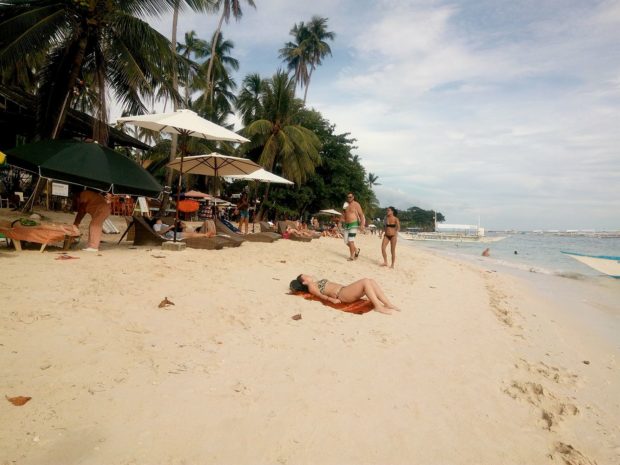Panglao Island: Sewage woes beset tourism gem

Tourist enjoy sun and sand on Alona Beach in Panglao, unaware of the dangers posed by its
waters whose coliform levels have exceeded DENR standards. —LEO UDTOHAN
Up to 90 percent of the resorts on Panglao Island, the tourism jewel of Bohol province, have no wastewater facilities, according to a local government official.
“And 60 to 70 percent are not compliant with septic tank regulations,” said Panglao Councilor Rogelyn Clemeña-Degoma.
Panglao’s lack of wastewater and sewage facilities may qualify it to get help from the Department of Environment and Natural Resources (DENR).
Environment Secretary Roy Cimatu has offered to help local governments build their own sewerage facilities so they can avoid the environmental problems plaguing Boracay Island, which President Rodrigo Duterte has called a “cesspool.”
Cimatu said on Wednesday that local governments could turn to the DENR instead of relying on local water suppliers, “which might pass the construction costs on to the people’s water bills.”
“It is better to build sewage treatment facilities now than face a catastrophe later,” Cimatu said in a statement.
The environment secretary made the offer as the DENR is cracking down on environmental degradation not only in Boracay but also on Panglao Island and Palawan’s top tourist sites—El Nido and the Subterranean River national Park in Puerto Princesa.
Degoma said most resort owners and investors were reluctant to build their own sewerage system and wastewater treatment plant in Panglao because of the cost.
Even the requirement that septic tanks should have three to five chambers has not been complied with by some resort owners, she told the Inquirer.
Degoma’s admission that a big majority of resorts in Panglao have no wastewater facilities came days after Mr. Duterte threatened to shutdown erring resorts on the
island if they did not comply with environmental laws and regulations.
Unregulated development
Socioeconomic Planning Secretary Ernesto Pernia, a Boholano, has said that Panglao is suffering from environmental problems because of unregulated development, lax enforcement of laws and the surge in tourist arrivals.
Mr. Duterte earlier threatened to close down the world-famous Boracay in six months if its sewage and garbage problems were not solved.
On Alona Beach, some resorts empty their sewage and other wastes directly into holes in the ground, which then go to the waters surrounding coral reefs and other sensitive marine habitats.
Degoma said the local government should strictly implement the “no discharge permit, no business permit,” policy and inspect the sewerage treatment plant of each establishment.
Panglao has at least 200 business establishments but only 33 have permits from the Environmental Management Bureau (EMB).
The EMB reported in January that the levels of fecal coliform on Alona Beach in Barangay Tawala in Panglao town, had exceeded DENR standards for recreational water.
Test results showed that total fecal coliform in the area was 305.70 most probable number (MPN) per 100 milliliters, way above the acceptable level of 100 MPN per 100 ml.
The total coliform (including other forms of coliform) level in waters of the village of Tawala in the second quarter of 2017 peaked at 841.69 MPN per 100 ml, still below but near the safe level of 1,000 MPN per 100 ml for water for swimming and other activities, according to the EMB report.
Bohol Gov. Edgar Chatto said on Wednesday that the resort owners had been properly warned.
“We have never tolerated any violation,” said Chatto as he stressed that Bohol was the first local government in the country to pass an “Environmental Code.”
He said the provincial government had a design of the wastewater treatment facility to be put up on Alona and the whole Panglao Island. He asked the national government to fund it.
The Panglao municipal government neither has the funds to build a wastewater treatment facility, said acting Panglao Mayor Pedro Fuertes.
Cimatu urged tourist sites to invest in sewage systems now.
Untapped fund
Under the National Sewerage and Septage Management Program, cities and first-class municipalities can avail themselves of a 50-percent grant from the national government to help fund their sewerage systems, Cimatu said. The grant, however, has remained untapped.
“We must keep in mind that we are doing this for the environment, and for the benefit of the people,” Cimatu said.
He said many tourism hot spots in the country did not qualify for the grant partly because they were not located in cities or in first-class municipalities. —With a report from Jaymee T. Gamil














